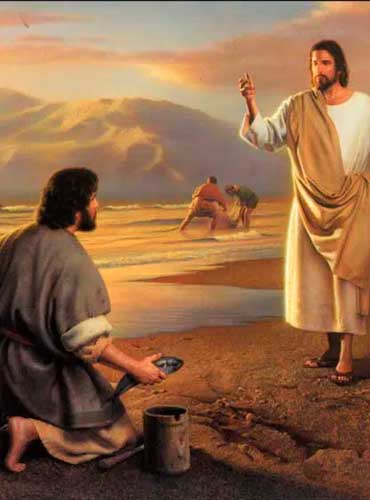Monday of the Fourth Week of Ordinary Time – Option 1 – Mk 1:1-20
Today’s Gospel presents us with the Gerasene demoniac. While there is a lot we could say about the episode, two elements stand out: first, Jesus’ interaction with the demons, and, second, the response of the townspeople.
Regarding the first, Christ’s interaction with the demons, it calls our attention that Jesus sends them into a herd of swine. Absolutely speaking, as God, Jesus didn’t have to send the demons there; after all, He’s God, and He doesn’t need material things like pigs to get rid of demons. Rather, if Christ sent the demons into pigs, there’s a reason why it’s appropriate or fitting, and the Church Fathers offer two such motives.
First, because it offered proof for the townspeople that the man had really been healed, and miraculously at that. The evangelist numbers the pigs at 2,000 (cf. Mk 5:13), and the sight of such a torrential cascade of pigs leaping off of the cliff, into the sea, would’ve made the exorcism, and who the exorcist was, pretty clear.
Secondly, and perhaps more importantly for us, it reveals the value that men have before God. Although it’s hard to get a financial assessment of the damage inflicted on the herdsmen during this exorcism, the loss of 2,000 pigs would certainly have been costly. For the demons, it’s all the same: Saint Peter Chrysologus says, rather bluntly, that the demons weren’t thinking of getting rid of their bad odors, but rather of simply changing odors. For the demons, there isn’t a difference between a man and a pig; for them, it’s all the same, smelly mess.
For Christ, however, the appraisal is quite different. Christ wasn’t simply in the territory of these demoniacs because He happened to be wandering through on a pleasant stroll; at the end of the previous chapter, He had taken the boat across the sea, through a storm, miraculously calmed the waves, and then disembarked in what must’ve been an abandoned place, and took the path which, as God, with all the knowledge in world, He already knew was on a direct collision course with the demoniac. Christ went deliberately to encounter him, to bring him healing and peace. In Matthew’s Gospel Christ will tell us, “So do not be afraid; you are worth more than many sparrows” (Mt 10:31). That phrase is perhaps more edifying than, “Do not be afraid; you are worth more than two thousand pigs,” but the truth is the same: Christ values us highly, wants us to be saved, and always takes the initiative.
This, however, brings us to our second point: the reaction of the townspeople. It’s surprising that after the man is healed, the townspeople beg Jesus to leave. That word for “beg,” the Greek παρακαλέω (parakaléō), from which we get the word paraclete, has the sense of a very up close and personal request; the people really didn’t want Jesus around, and, in this, they echo the words of the demons. Commenting on the demons’ words, “What have you to do with me, Jesus, Son of the Most High God?,” Saint Thomas Aquinas replies, “Absolutely nothing, because there’s nothing in common between Christ and Belial, [the devil].” Or, as Saint Jerome says, “The presence of the Savior is the torment of demons.” Demons will always be tormented by Christ and will beg Him to leave them alone; only man, and only during this life, can ask Christ either to draw nearer, or to get lost.
Most Fathers of the Church say that the reason for the townspeople’s request is, in a sense, financial. After all, Jesus has only just arrived, and already the town is 2,000 pigs less. In another sense, though, the reply of the townspeople is even more sinister: the only thing they know about Jesus is that he is an exorcist and probably there are many more demons in their town. Rather than suffer the financial loss, essentially they’re telling Jesus, “Look, we’d like to keep the demons around if it means we can keep our stuff.”
Likewise, Christ doesn’t force us to follow Him; if we want, we can hold on to our vices, our defects, and our shortcomings. To do that, however, is short-change ourselves, to value ourselves and our souls like a few swine. And that is precisely what the devil does and wants. Today, we can ask ourselves about our willingness to allow Christ to heal us and guide us on the path to holiness. The word demon comes from the Greek word for divide, and anything that separates from God divides us, and keeps us from Him. Are we willing to give up the things that we cling to, in order to be restored in Christ?
Let us pray, through the intercession of Mary, Queen of Heaven, for the grace to let go of our defects, sins, and attachments, so as to be able to follow Christ whole-heartedly.






